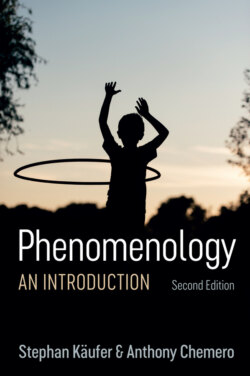Читать книгу Phenomenology - Anthony Chemero - Страница 7
What you will not find in this book
ОглавлениеHere is one way to explain our focus and distinguish it from strains of phenomenology that we will not pursue in this book. One prominent concern of phenomenology has been to provide an account of the structures that make a shared, objective world intelligible. This account focuses on perception and cognition, and recognizes that bodies and skills are fundamental in making up this intelligibility. We consider this to be the central, most important, and most productive strain of phenomenology, and this book is intended to give a clear introduction to it.
Another strain of phenomenology, which we can only explore briefly in this book, is concerned to give a description of subjective experiences, especially of experiences that are unusual and hard to explain. So, for example, phenomenology might provide an analysis of what it is like to experience religious faith, overpowering sentiments such as love or anxiety, aesthetic highs, inescapable ambiguities and paradoxes, and so forth. This is an important task, and quite often it intermingles with the first task. In Heidegger’s work, in particular, an understanding of anxiety and contingency is part and parcel of his explanation of the intelligibility of the world. In general, Husserl, Heidegger, and Merleau-Ponty were broad and innovative thinkers and their writings touch on art, religion, politics, aesthetics, and morality. Existentialism is largely an offshoot of phenomenology, and so is much critical theory in literary studies. Consequently, phenomenology has influenced many different fields, too many to cover in a single book. Browse the faculty pages of a university website, and you may find a large number of people in literature departments, film and theater studies, theology, art, and political science who identify their work as “phenomenology.” We do not deny the importance of this phenomenology in these various fields. But a single book cannot presume to cover all this material. Our choice of topics and authors is motivated primarily by our conviction that contemporary work on embodied cognitive science is a particularly clear and relevant continuation of the most central concerns that Husserl, Heidegger, and Merleau-Ponty were pursuing.
A further preliminary distinction might be helpful. As is well known, English-speaking philosophy has for over half a century perceived a division between so-called “analytic” and “continental” approaches. Some philosophers on either side of the divide want to identify phenomenology with the “continental” approach, either to acclaim or to disparage the entire tradition wholesale. Those who prefer a “continental” approach would probably choose a sequence of authors that leads from Heidegger and Merleau-Ponty to Sartre, Derrida, and Levinas, and perhaps more current authors such as Badiou. That is a fine sequence of authors to study, and such overviews are available in many other books. But that is not our approach. We do not think the distinction is helpful or accurate at all, even aside from the obvious incongruity that “continental” is a geographic term while “analytic” is a stylistic or methodological one. Much analytic philosophy is done on the continent, and much good work in English-language philosophy consists of using analytic methods to explain the work of European philosophers. That is what we aim to do in this book. The goal of all philosophy, we think, is to give as clear an account as possible of the best available view on the big questions that motivate philosophy in the first place. We think that Husserl, Heidegger, and Merleau-Ponty articulate hard-won insights into the nature of the human ability to make sense of the world. Their writing is sometimes obscure, because they address very fundamental questions, make unexpected proposals that fly in the face of centuries of philosophical tradition, and often invent new language to render their ideas. Our job is to use what scholars have learned over the past decades to try to make it easier for today’s students to appreciate the insights of phenomenology.
